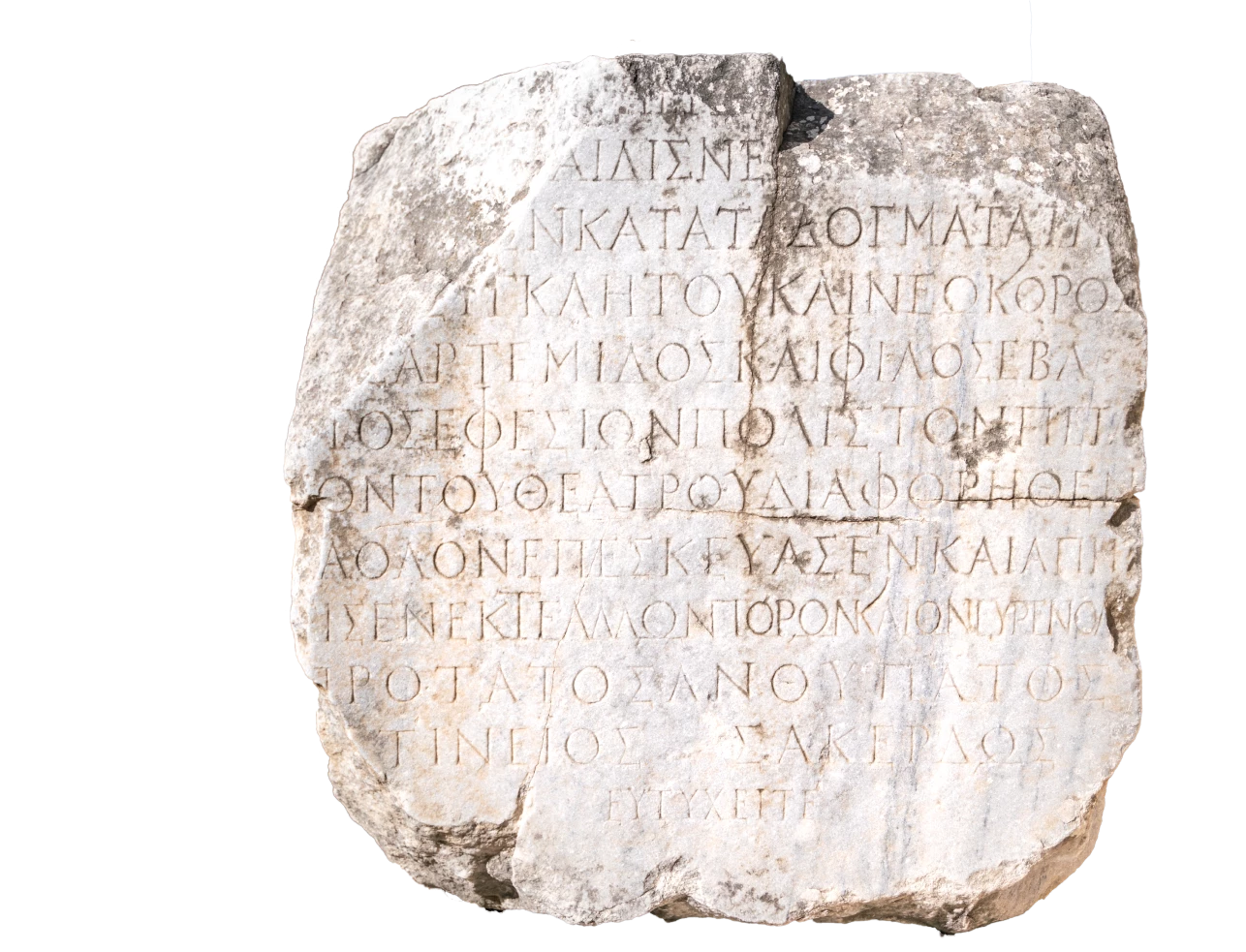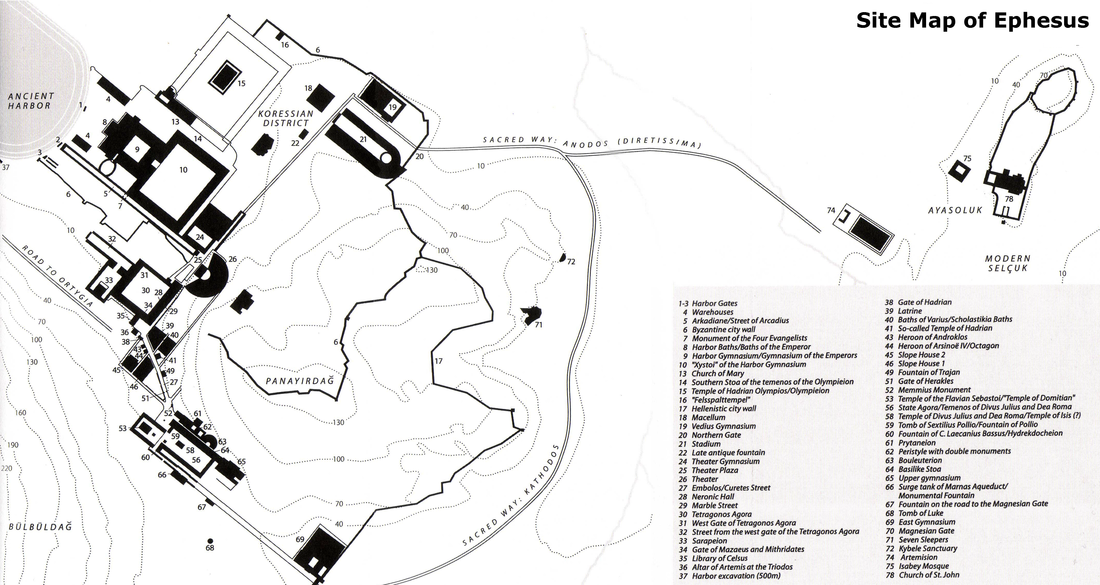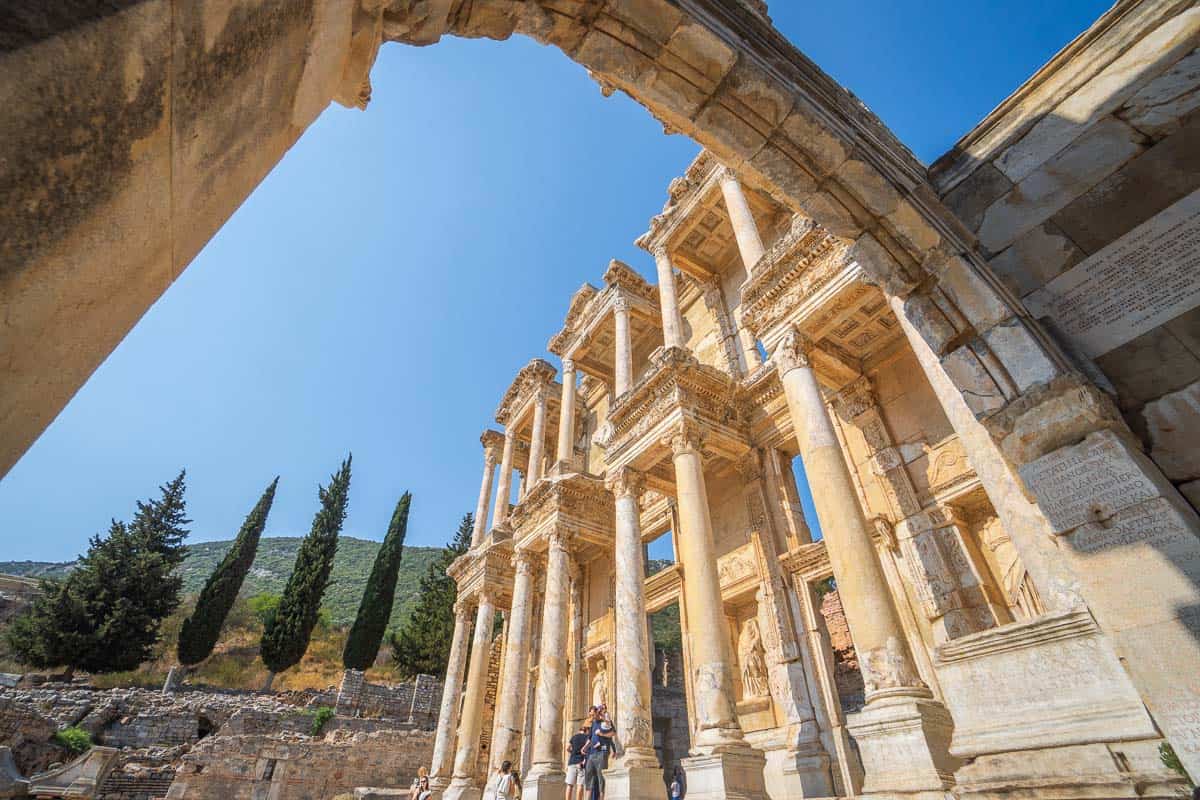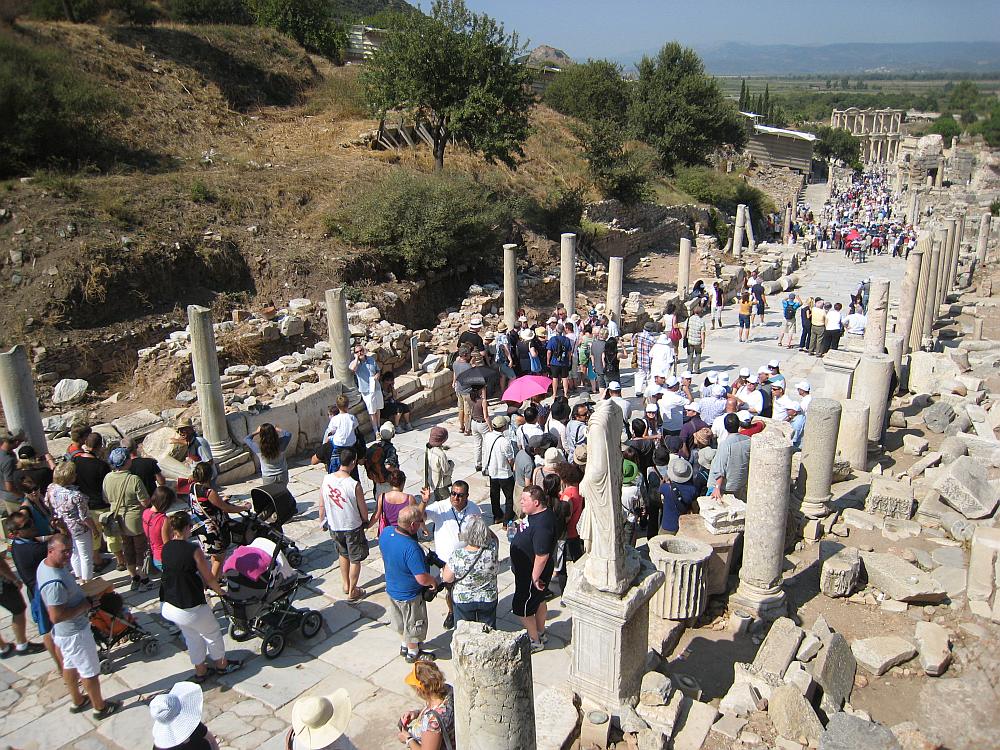Ephesus Open Air Museum is one of Turkey‘s most remarkable historical sites, drawing visitors from around the world for its blend of ancient architecture, cultural significance, and insights into life during the Greek and Roman periods.
Table of Contents
Introduction
Ephesus Open Air Museum, located in the hills of Selçuk, Izmir, is one of Turkey’s most extraordinary and well-preserved archaeological wonders. As one of the most powerful cities of the ancient Greek and Roman world, Ephesus offers travelers a rare glimpse into the daily lives, architecture, and culture of civilizations past.

For first-time visitors, Ephesus isn’t just a site to see—it’s a world to experience. From grand temples to bustling marketplaces, Ephesus Open Air Museum is a must-visit for any traveler eager to step back in time.

From Greek Origins to Roman Splendor
Situated along the Aegean coastline, Ephesus stands as a timeless testament to the grandeur of ancient civilizations. From its modest beginnings as a Greek colony to its transformation into a Roman metropolis, the city’s layered history reflects the cultural, religious, and architectural evolution of the ancient world. Revered as the home of the Temple of Artemis and later adorned with Roman marvels like the Library of Celsus, Ephesus is not just a relic of the past but a vivid narrative of human ingenuity, devotion, and ambition. Each stone, column, and inscription weaves a tale of resilience and grandeur, drawing modern visitors into the heart of antiquity.

The Greek Period
Founded by Greek colonists around the 10th century BCE, Ephesus was originally a small but strategic port city along the Aegean Sea. Known for its devotion to the goddess Artemis, the city quickly grew in wealth and cultural significance, attracting artisans, traders, and scholars from all over the Mediterranean. The Temple of Artemis, once one of the Seven Wonders of the Ancient World, was a crowning achievement during this period and a magnet for pilgrims and visitors.
The Greek influence is evident throughout the city’s layout and architecture. Greek columns, statues, and public spaces like the agora (marketplace) and theaters speak to the city’s classical roots, creating a distinct fusion of Greek style with local Anatolian culture.

The Roman Period
By the 2nd century BCE, Ephesus became a major Roman city, reaching its golden age under Roman rule. The Romans expanded Ephesus extensively, introducing new architectural marvels like the Celsus Library, one of the most famous libraries of antiquity, and the Grand Theater, capable of holding up to 25,000 spectators. As the Roman Empire’s wealth and influence spread, Ephesus transformed into a cosmopolitan hub for trade, religion, and knowledge. This period marked the height of Ephesus’ grandeur and left behind many of the structures that continue to captivate visitors today.

Must-See Highlights of Ephesus for First-Time Explorers
Ephesus is a treasure trove of ancient wonders, offering visitors a glimpse into the grandeur of one of the world’s most influential cities. For first-time explorers, the city’s iconic landmarks provide an unforgettable journey through time, from its Roman architectural masterpieces to its sacred and cultural treasures.

Whether you’re marveling at the grandeur of the Library of Celsus, walking along the historic Odeon, or uncovering the daily lives of the elite in the Terrace Houses, Ephesus promises a profound connection to history.
Here’s what you can’t miss on your visit even if you tried:
The Odeon: Ephesus’ Intimate Theatre of Power
For most visitors entering from the upper Magnesian Gate, the Odeon is the first place where Ephesus suddenly feels alive.
Shaped like a compact theater and tucked just above the State (Upper) Agora, this semi-circular building once seated around 1,500 people and was originally covered by a wooden roof that amplified every word and note.
Built in the 2nd century AD by the wealthy citizen Publius Vedius Antonius and his wife Flavia Paiana, it was designed for clarity, not noise – a space where voices mattered more than spectacle.
The Odeon had a double identity. By day, it functioned as a bouleuterion – the city council house where Ephesus’ aristocratic elite debated taxes, urban projects, and local politics. By night or on feast days, it transformed into an intimate concert hall, hosting performances, speeches, and recitations under its now-lost roof.
When you sit on the lower marble tiers and look toward the shallow stage, it’s easy to picture the combination of music, rhetoric, and decision-making that once shaped the fate of the city here. From this small “parliament-theatre,” the natural progression of a visit leads you out toward Curetes Street and down into the heart of Ephesus.
Curetes Street

Curetes Street is more than just a pretty marble road – it’s the spine of Ephesus, tying together politics, religion, commerce, and daily life. Paved in gleaming marble and lined with fountains, statues, shops, and townhouses, it formed part of a sacred processional route linked to the cult of Artemis, which is why it takes its modern name from the Curetes – priestly figures associated with her rites and the eternal flame at the Prytaneion.

In urban terms, Curetes Street connected the Upper/State Agora and the Odeon area – the political brain of the city – with the Lower/Commercial Agora and The Library of Celsus, the commercial and intellectual heart. Walk it downhill and you’re literally moving from council chambers and sacred spaces toward shops, libraries, and the grand theater.
Terraced houses of the city’s elite once rose on its slopes, with mosaicked floors and painted walls looking out over the flow of pedestrians below. And you can read more about them below. Click to side!

Today, tracing the route from the Odeon down Curetes Street is one of the best ways to feel the choreography of ancient Ephesus: senators leaving a heated debate, priests processing in ritual, merchants opening their shutters, and travelers drifting toward the Library of Celsus – all sharing the same marble artery that still guides visitors through the city.
Terrace Houses
.jpg)
A lesser-known gem within Ephesus, the Terrace Houses reveal the luxurious lifestyle of the city’s wealthiest residents. Decorated with intricate mosaics and frescoes, these homes provide insight into the opulence of Ephesus’ elite class.
The remarkably preserved interiors showcase rooms with marble floors, central courtyards, and even heating systems.
Entry to the Terrace Houses requires a separate ticket, but it is well worth it for those interested in seeing another side of life in ancient Ephesus.
The Library of Celsus

One of Ephesus’ most iconic structures, the Library of Celsus is an architectural marvel. Built in 114 CE as a tribute to the Roman senator Tiberius Julius Celsus, the library was once home to over 12,000 scrolls and manuscripts.
Its grand facade, with its beautifully carved columns and statues, is one of the most photographed monuments in Ephesus.
Don’t miss this stunning example of Roman architecture and a testimony to the city’s dedication to knowledge and learning.
The Grand Theater

The largest outdoor theater of the ancient world, Ephesus’ Grand Theater stands as a testament to the city’s importance in the cultural landscape of antiquity.
Hosting plays, concerts, and gladiatorial contests, this theater is still known for its impressive acoustics.
Climb to the top for a panoramic view of the entire city and imagine the sounds of cheers and performances that once filled this space.
Practical Tips for Visiting Ephesus Open Air Museum

Here are some ideas that might help:
- Arrive Early or Late: Ephesus can get quite crowded, especially during peak tourist seasons. To avoid the rush, plan to arrive early in the morning or later in the afternoon when the site is less busy, and the lighting is perfect for photography.
- Wear Comfortable Shoes: The ancient city spans a large area, and the marble paths can be uneven. Comfortable walking shoes are essential for navigating Ephesus’ streets and exploring the various ruins.
- Bring Sun Protection: There is minimal shade within the open-air museum, so make sure to bring a hat, sunscreen, and plenty of water, especially if visiting during the summer.

- Hire a Guide or Use an Audio Guide: The history of Ephesus is rich and complex, and having a knowledgeable guide can enhance your understanding of the site. Many guides are available at the entrance, or you can rent an audio guide to accompany you on your journey through the ruins.
- Don’t Miss the Nearby Ephesus Museum: After exploring the main ruins, consider visiting the nearby Ephesus Archaeological Museum in Selçuk, where many of the artifacts from the site, including statues, jewelry, and mosaics, are displayed. The museum provides context for what you’ve seen at the site and offers a deeper appreciation for the city’s history.

Stories Behind the Stones
Step beyond the grandeur of Ephesus’ iconic landmarks to uncover the tales of its early Christian heritage, advanced Roman engineering, and everyday life on its marble streets. This ancient city is a living chronicle of innovation, faith, and culture.
- Christian Heritage: Ephesus is mentioned in the Bible and holds significance for early Christianity. It is believed that the Apostle John lived here and wrote his Gospel in the city.

St. Paul preaching in Ephesus - Hydraulic Engineering: The Romans built complex aqueducts and water systems to provide fresh water to the city’s inhabitants.
- Marble Roads: Ephesus was famed for its marble streets, which remain remarkably well-preserved to this day.

Roman baths - Roman Bathhouses: Ephesus was equipped with public bathhouses, which served as social hubs where residents relaxed and engaged in discussions and business.
Conclusion
Ephesus Open Air Museum is not just a site; it’s an experience that transports you to the heart of ancient Greek and Roman culture. Its temples, theaters, streets, and houses whisper stories of an era that shaped civilization itself. For anyone interested in history, architecture, or simply the allure of antiquity, Ephesus is a remarkable journey through time that every traveler should take. So, if you’re planning a trip to Turkey, add Ephesus Open Air Museum to your itinerary—it’s a place where history truly comes to life.

Get in touch with us for a guide
At The Other Tour, we craft tailor-made journeys blending independence and expert guidance. From flights to hotel arrangements, we ensure stress-free travel.
Explore destinations like Istanbul, Cappadocia, or Ephesus your way—join group tours for highlights or opt for private guidance for a personal touch.
In Ephesus, don’t miss the Open-Air Museum, a breathtaking ancient city showcasing iconic landmarks like the Library of Celsus, the Great Theatre, and the Temple of Artemis.
Contact us to book your unforgettable journey today!









Thanks for the comprehensive post, Soner! It is quite detailed and exhaustive as well as up-to-date!
Thanks Akis! We really appreciate all your lovely comments on our articles.